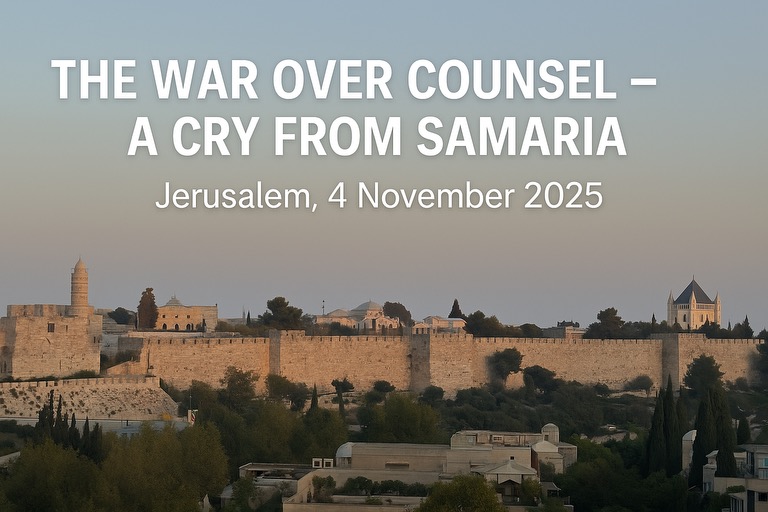
Jerusalem — 4 November 2025, 4:56 a.m.
From my balcony on Itzchak Kariv Street, the Old City lies before me, its stones catching the first thin light. The Tower of David catches the first gleam of the sun, and the stones along Mount Zion turn from grey to gold. The air is still, carrying the faint smell of olives and dust. Below, the streets are empty; only the soft hum of the waking city moves through the valley. It is one of those moments when Jerusalem feels suspended between heaven and history — unchanging in appearance, yet alive with the weight of decisions being written far beyond these walls.
Inside, my notes from Thursday’s meeting with Governor Yossi Dagan cover the table. His words still fill the room. They echo the headlines arriving by the hour — renewed pressure from Washington, the Istanbul declaration, and Israel’s unresolved struggle over sovereignty in Judea and Samaria.
When Bill and I met Dagan in Jerusalem on 30 October, I asked whether he was disappointed. “Yes,” he said — and began to explain why.
In late September, after President Trump publicly told Arab partners that his renewed peace framework would exclude any annexation of Judea and Samaria, Dagan booked a flight to New York. “I went to speak with the prime minister before he met the president,” he said. “It was the last chance to talk about Judea and Samaria.”
He met Prime Minister Benjamin Netanyahu for nearly two hours on the eve of the 29 September White House meeting. Dagan, who has known him for twenty years, expected debate; he found resignation.
“When I looked at his eyes,” Dagan said, “I saw a woman who has been raped — violated, stripped of choice. That’s what had been done to him. There was nothing left to say. I changed my own speech after that.”
For Dagan, the image was not anger but diagnosis: a leader already constrained by forces beyond the room.
The following day Netanyahu and Trump presented their twenty-point regional framework. Annexation was missing. Washington’s goal was to consolidate Arab partners after the August strikes on Iran’s nuclear sites. Keeping that coalition intact meant postponing Israeli sovereignty. The calculation was strategic; the cost, national. Dagan left New York convinced that the decision on Judea and Samaria had been made elsewhere.
Five weeks later, the same pattern appeared again. In a CBS 60 Minutes interview aired 2 November, Trump said he had “pushed Netanyahu” to accept the Gaza cease-fire and that the U.S. would “be involved” in the Israeli premier’s criminal trial “to help him out.” Whatever the intention, the effect confirmed Dagan’s private description: policy and justice influenced from outside.
Meanwhile, Turkey and six allied Muslim states met in Istanbul on 3 November, declaring that Gaza’s reconstruction “must be Palestinian-led and free of foreign hegemony.” It was a diplomatic move to assert Muslim stewardship over Gaza’s future — another conversation about Israel held without Israel in the room.
The Istanbul meeting also revealed a deeper alignment taking shape: Ankara and Riyadh finding cautious common ground after years of rivalry, both intent on shaping a post-Gaza regional order. Diplomats in Amman and Cairo now describe a “Muslim-Arab coordination framework” designed to pre-empt Western trusteeship plans and keep reconstruction funds under regional control. It is the kind of quiet restructuring that redraws influence maps without a single shot fired.
Inside Israel, Finance Minister Bezalel Smotrich speaks of annexation maps and preparatory committees, but no formal act of sovereignty has been announced. Analysts now call it “de facto annexation without de jure decision.” For Dagan, that phrase describes exactly what he feared in New York: when sovereignty is deferred, it is already being surrendered.
The political opposition is divided on how to answer it. Centrist parties accuse the government of “diplomatic paralysis,” while coalition hard-liners call for a declaration of sovereignty before the next American election cycle. Behind the scenes, senior security officials warn that any unilateral step could freeze cooperation with Jordan and the Gulf. The argument has moved from ideology to timing — how long Israel can wait before delay becomes default.
As head of the Samaria Regional Council, Dagan oversees forty communities and about forty thousand residents. His work is administrative — zoning, roads, schools, security coordination — but its purpose is political: to make Israeli law a living fact in areas still governed by interim arrangements.
“We build factories, kindergartens, roads,” he said. “But the signature is still missing.”
To Dagan, the fight is not ideological but structural — who drafts Israel’s decisions before they are announced. Annexation, he believes, was lost not in debate but in pre-decision counsel — the quiet briefings where diplomatic logic overrode conviction. “Before borders move,” he told us, “voices move.”
Dagan often contrasts two Israels. One lives by covenant, grounded in the belief that Judea and Samaria are inseparable from national identity. The other lives by contract, prioritizing alignments that postpone decisions. The tension between them now defines Israeli politics: conviction weighed against caution, and action delayed by diplomacy.
From my balcony in Mamilla, the Old City glows under the first light of morning. The rays of sunlight spread slowly across the ancient stones, carrying echoes of prayers and promises spoken through centuries. The walls look unchanged, but every negotiation still reverberates against them — reminders that power shifts, but covenant endures.
Here in Jerusalem, history and eternity breathe in the same air. Decisions are debated in far capitals, yet this city remains what she has always been: the heart of a promise made by God Himself. Governments may write policies; only He writes destiny.
As the sun rises, the gold deepens on the domes and rooftops, and Jerusalem stands radiant — the city of the Almighty, the wife of the Judge of the universe. Politics may pass, leaders may falter, but His promises remain unchangeable, and His love over her endures forever.